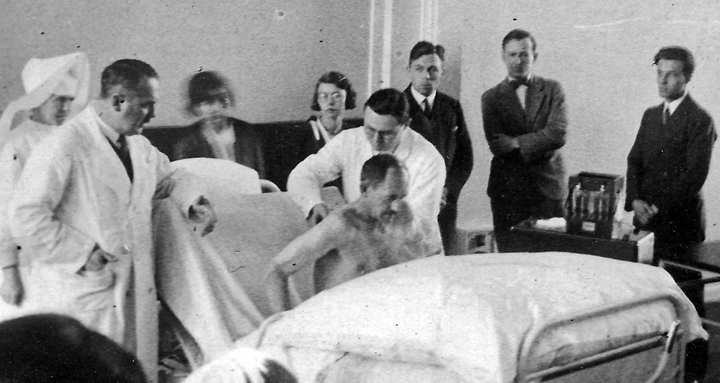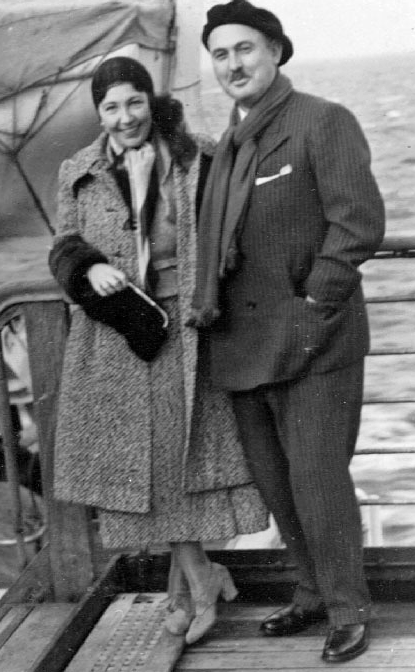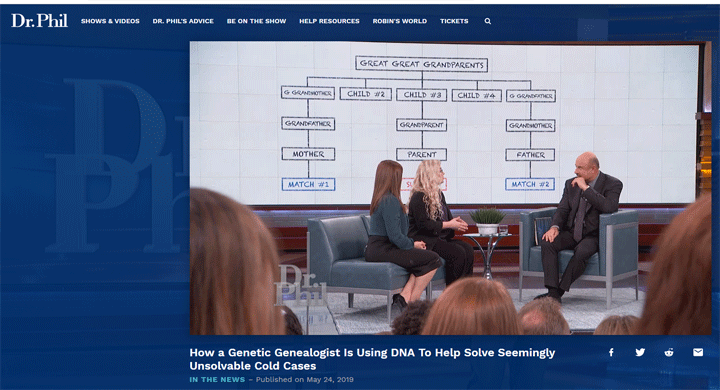Try to imagine starting over in a different county whose language you barely speak at the age of 50 when at the height of a successful career. That is what my grandfather, my “Opa,” had to do. He was a distinguished German medical doctor and scientist, a university professor and famed diagnostician. The University at Freiburg had constructed a clinic for him to entice him to head up their internal medicine department at their Medical School. But only a few years after his move to Freiburg came the dismissal of all jewish professors as part of Hitler’s new policies.

Opa teaching during rounds in the clinic in Frieburg, he is all the way to the left
My Catholic grandmother “Oma” urged him to leave Germany and accept one of the offers he had from various universities in America and Turkey. My Opa thought the antisemitism would pass as it had in the past, after all he had an iron cross for his bravery in World War I and a flourishing private practice. She eventually convinced him it would be better for their three daughters if they left until it blew over. They never returned.

Oma and Opa on the boat to America
I had not realized how difficult this move must have been for him nor understood why he never went back to Germany even for a visit. However recently I read a translation of a letter he wrote in 1946 to his former colleagues when he was invited to return. This is thanks to my cousin’s son Sam Sherman, an artist living in New York City, who has been travelling in Germany doing research as part of his MFA graduate studies at CUNY Hunter College. When in Freiburg he found much of interest in the University archives, including this letter.
These words my Opa wrote really struck me: “ I cannot return, the wound is too deep, it will never heal. The disappointment of my trust in the good in German people, in the honesty of my friends was too great. The years that I can still work productively belong to the country that took me in during my deepest anguish and supported me.”
The letter includes poignant descriptions of leaving Germany and of learning new ways of teaching and approaching medical research in America.
All of the following italicized words are from his letter of 1946:
Leaving Germany
“ The train that my family and I would take to the ship gasped in the Freiburg train station. Hundreds of schoolchildren surrounded my three girls, and women, including wives of my former faculty colleagues, brought my wife to the car compartment. Few men were present. They had avoided seeing and greeting me for months. I was alone. “Must I leave, must I then leave the city,” the schoolchildren sang. I believed the world was sinking under my feet. Everything I did, what I loved, my wonderful clinic that I was allowed to build, my friends – everything was lost.”
[UPDATE from my brother] In those days it took 15 minutes for a steam engine to get ready to go (build up a head of steam) so it was customary to see important people or loved ones off at the train station. Thus the fact that the men were not there was a big snub. Also the folk song Muss i’denn is about a young man leaving his beloved one home forever due to larger events in the world beyond his control. So the choice of the women to sing this harmless folk song is perhaps a veiled criticism of the Nazi regime.
Continue reading →






